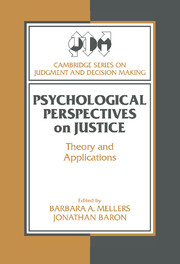Book contents
- Frontmatter
- Contents
- Series preface
- Contributors
- Part I Introduction
- Part II Psychological perspectives
- Part III Economic perspectives
- Part IV Variations in perspectives on justice
- The unfolding of justice: A developmental perspective on reward allocation
- Of ants and grasshoppers: The political psychology of allocating public assistance
- Liberal and conservative approaches to justice: Conflicting psychological portraits
- Part V Policy perspectives
- Part VI Conclusion
- Name index
- Subject index
Of ants and grasshoppers: The political psychology of allocating public assistance
Published online by Cambridge University Press: 24 October 2009
- Frontmatter
- Contents
- Series preface
- Contributors
- Part I Introduction
- Part II Psychological perspectives
- Part III Economic perspectives
- Part IV Variations in perspectives on justice
- The unfolding of justice: A developmental perspective on reward allocation
- Of ants and grasshoppers: The political psychology of allocating public assistance
- Liberal and conservative approaches to justice: Conflicting psychological portraits
- Part V Policy perspectives
- Part VI Conclusion
- Name index
- Subject index
Summary
A grasshopper that had merrily sung all the summer was almost perishing with hunger in the winter. So she went to some Ants that lived nearby, and asked them to lend her a little of the food they had put by. “You shall certainly be paid before this time of year comes again”. said she. “What did you do all summer?” asked they. “Why, all day long, and all night long too, I sang, if you please”, answered the grasshopper. “Oh! you sang, did you?” said the Ants. “Well, now then, you can dance.”
–Aesop's fable (Rundell, 1956)The United States is still one of the most prosperous countries in the world. However, millions of people are destitute and rely on the generosity of the community for their survival. What obligations does the community have to these people? What responsibilities do these people have to the community? Answers to these fundamental questions depend largely on one's political point of view. In the 1960s, the Johnson administration declared “war on poverty” and the welfare state proliferated. During the 1980s and early 90s, many political leaders concluded that the welfare state was a failure, and attempted (sometimes successfully, sometimes not) to dismantle social programs and to stress the virtues of self-reliance and free markets.
The United States is both a democratic and capitalistic society. However, the marriage between capitalism and democracy is often tense (Dahl, 1989). On the one hand, capitalism fosters a belief in individualism and self-determination.
- Type
- Chapter
- Information
- Psychological Perspectives on JusticeTheory and Applications, pp. 205 - 233Publisher: Cambridge University PressPrint publication year: 1993
- 27
- Cited by



